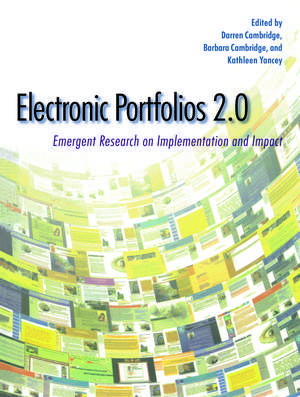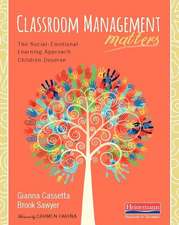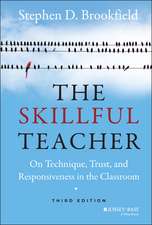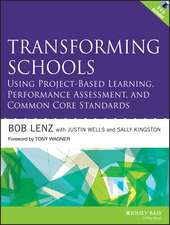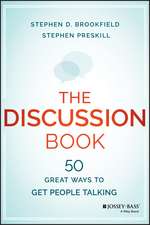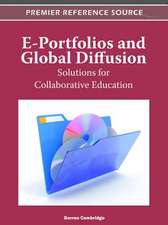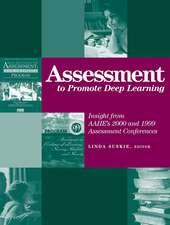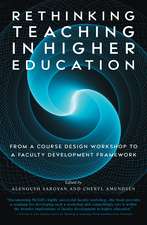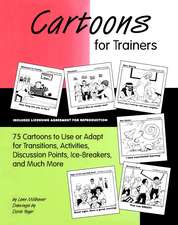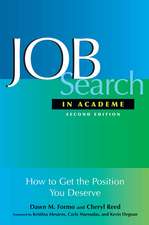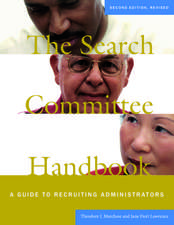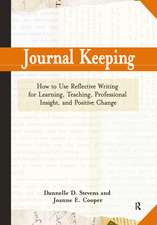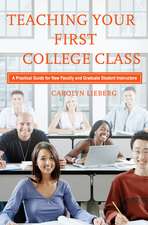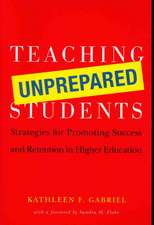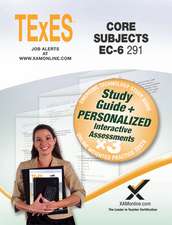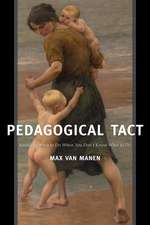Electronic Portfolios 2.0: Emergent Research on Implementation and Impact
Editat de Darren Cambridge, Kathleen Blake Yancey, Barbara Cambridgeen Limba Engleză Paperback – 16 mar 2009
Preț: 314.54 lei
Nou
Puncte Express: 472
Preț estimativ în valută:
60.21€ • 65.42$ • 50.61£
60.21€ • 65.42$ • 50.61£
Carte disponibilă
Livrare economică 31 martie-14 aprilie
Preluare comenzi: 021 569.72.76
Specificații
ISBN-13: 9781579223212
ISBN-10: 1579223214
Pagini: 218
Dimensiuni: 212 x 279 x 15 mm
Greutate: 0.57 kg
Ediția:1
Editura: Taylor & Francis
Colecția Routledge
Locul publicării:Oxford, United Kingdom
ISBN-10: 1579223214
Pagini: 218
Dimensiuni: 212 x 279 x 15 mm
Greutate: 0.57 kg
Ediția:1
Editura: Taylor & Francis
Colecția Routledge
Locul publicării:Oxford, United Kingdom
Public țintă
PostgraduateCuprins
Acknowledgements; INTRODUCTION. On Transitions. Past to Present—Barbara Cambridge; SECTION ONE. INTRODUCTION. REFLECTION IN ELECTRONIC PORTFOLIO PRACTICE 1. Reflection and Electronic Portfolios. Inventing the Self and Reinventing the University–Kathleen Blake Yancey, Florida State University; 2. Studying Student Reflection in an Electronic Portfolio Environment. An Inquiry in the Context of Practice–W. H. Rickards, Alverno College and Lauralee Guilbault; Using ePortfolios to Support Lifelong and Lifewide Learning–Helen L. Chen, Stanford University; SECTION TWO. INTEGRATIVE LEARNING 4. Two Faces of Integrative Learning Online–Darren Cambridge, George Mason University; 5. Becoming ePortfolio Learners and Teachers–Julie Hughes, Wolverhampton University; 6. Making Connections. The LaGuardia ePortfolio–Bret Eynon, LaGuardia Community College; 7. Connecting Contexts and Competencies. Using ePortfolios for Integrative Learning–Tracy Penny Light, Bob Sproule, and Katherine Lithgow, University of Waterloo; SECTION THREE. ESTABLISHING IDENTITIES. ROLES, COMPETENCIES, VALUES, AND OUTCOMES 8. Influencing Learning Through Faculty- and Student-Generated Outcome Assessment–Michael Day, Northern Illinois University; 9. The Promise of E-Portfolios for Institutional Assessment–Thomas S. Edwards and Colleen Burnham, Thomas College; 10. Demonstrating Intellectual Growth and Development. The IUPUI ePort–Sharon Hamilton and Susan Kahn, Indiana University, Indianapolis; 11. A Values-Driven ePortfolio Journey. Na Wa‘a–Judith Kirkpatrick, Tanya Renner, Lisa Kanae, and Kelli Goya, Kapiolani Community College; 12. E-Portfolios in an Undergraduate Psychology Research Experiences Program–Benjamin R. Stephens, Clemson University; 13. Perceptions of Teacher Candidates on ePortfolio Use–Neal W. Topp and Robert L. Goeman, University of Nebraska Omaha; SECTION FOUR. ORGANIZATIONAL LEARNING. 14. Diffusing ePortfolios in Organizational Settings–Stephen R. Acker, The Ohio State University; 15. A Catalyst Without a Mandate. Building an ePortfolio Culture at the University of Washington–Tom Lewis and Janice Fournier, University of Washington; 16. Documenting the Outcomes of Learning–Milton D. Hakel and Erin N. Smith, Bowling Green University; 17. Sustaining Change through Student, Departmental, and Institutional Portfolios–Kathi A. Ketcheson, Portland State University SECTON FIVE. ELECTRONIC PORTFOLIO TECHNOLOGY AND DESIGN FOR LEARNING 18. Technology and Change–Cara Lane, University of Washington; 19. Re-visioning Revision with ePortfolios in the University of Georgia First-year Composition Program–Christy Desmet, June Griffin, Deborah Church Miller, Ron Balthazor, and Robert Cummings, University of Georgia; 20. Moving eFolio Minnesota to the Next Generation. From Individual Portfolios to an Integrated Institutional Model–Lynette Olson, Lori Schroeder, and Paul Wasko, Minnesota State Colleges and Universities; 21. Assessing the Learning Potential of E-Portfolio Through Thinking Sheets–Mary Zamon and Debra Sprague, George Mason University; 22. The Maed English Education Electronic Portfolio Experience. What Preservice English Teachers Have to Teach Us About Eps and Reflection—Carl Y oung; CONCLUSION. MOVING INTO THE FUTURE—Barbara Cambridge, Darren Cambridge, and Kathleen Yancey; Index.
Notă biografică
Darren Cambridge is Senior Consultant for Education Technology and Online Communities of Practice for the American Institutes for Research.
Kathleen Blake Yancey is Kellogg W. Hunt Professor of English and Distinguished Research Professor at Florida State University. She has focused her research agenda on portfolios for the life of her career. In 1992, she published Portfolios in the Writing Classroom; in 1996, the co-edited Situating Portfolios, in 2001, the co-edited Electronic Portfolios: Emerging Practices in Student, Faculty and Institutional Learning; and in 2009, the co-edited Electronic Portfolios 2.0: Emergent Research on Implementation and Impact. She has served on the AAC&U VALUE Steering Committee and on the Board of Directors for the Association for Authentic, Experiential and Evidence-based Learning (AAEEBL), and she is a faculty member for WASC’s Assessment Leadership Academy and a mentor for WASC’s Community of Practice project. Yancey has also been the president or chair of several writing studies/literacy organizations, including the Council of Writing Program Administrators (CWPA), the Conference on College Composition and Communication (CCCC), and the National Council of Teachers of English (NCTE). Immediate Past Editor of College Composition and Communication, and past co-editor of the journal Assessing Writing, she has published over 100 refereed articles and book chapters and authored, edited, or co-edited 15 scholarly books, most recently Writing Across Contexts: Transfer, Composition, and Sites of Writing; and A Rhetoric of Reflection. She has been recognized with several awards, including the CWPA Best Book Award, the CCCC Research Impact Award, the FSU Graduate Mentor Award, the FSU Graduate Teaching Award, and the CCCC Exemplar Award.
Barbara Cambridge is Director of the Washington Office of the National Council of Teachers of English.
Kathleen Blake Yancey is Kellogg W. Hunt Professor of English and Distinguished Research Professor at Florida State University. She has focused her research agenda on portfolios for the life of her career. In 1992, she published Portfolios in the Writing Classroom; in 1996, the co-edited Situating Portfolios, in 2001, the co-edited Electronic Portfolios: Emerging Practices in Student, Faculty and Institutional Learning; and in 2009, the co-edited Electronic Portfolios 2.0: Emergent Research on Implementation and Impact. She has served on the AAC&U VALUE Steering Committee and on the Board of Directors for the Association for Authentic, Experiential and Evidence-based Learning (AAEEBL), and she is a faculty member for WASC’s Assessment Leadership Academy and a mentor for WASC’s Community of Practice project. Yancey has also been the president or chair of several writing studies/literacy organizations, including the Council of Writing Program Administrators (CWPA), the Conference on College Composition and Communication (CCCC), and the National Council of Teachers of English (NCTE). Immediate Past Editor of College Composition and Communication, and past co-editor of the journal Assessing Writing, she has published over 100 refereed articles and book chapters and authored, edited, or co-edited 15 scholarly books, most recently Writing Across Contexts: Transfer, Composition, and Sites of Writing; and A Rhetoric of Reflection. She has been recognized with several awards, including the CWPA Best Book Award, the CCCC Research Impact Award, the FSU Graduate Mentor Award, the FSU Graduate Teaching Award, and the CCCC Exemplar Award.
Barbara Cambridge is Director of the Washington Office of the National Council of Teachers of English.
Recenzii
"The book contains a wealth of data from schools that have been pioneers in the use of electronic portfolios. The authors identify emerging new critical questions, challenges, and opportunities for further development of this genre. A school seeking to integrate this pedagogiecal strategy will find this to be a helpful reference volume."
Jennifer R. Ayres, McCormick Theological Seminary
Teaching Theology and Religion
Jennifer R. Ayres, McCormick Theological Seminary
Teaching Theology and Religion
Descriere
This book features emergent results of studies from 20 institutions that have examined effects on student reflection, integrative learning, establishing identity, organizational learning, and designs for learning supported by technology.
